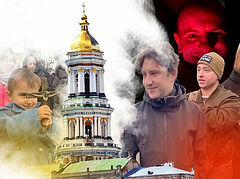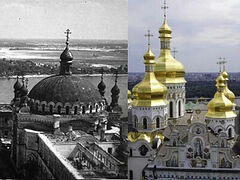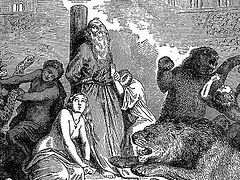Bishop Theodosius (Ivashchenko) of Seattle, a hierarch of the Russian Orthodox Church Outside Russia (ROCOR) was tonsured a monk in the Kiev Caves Lavra. He was once among those who labored to restore the monastic life in this monastery and so he takes what is happening there today very personally.
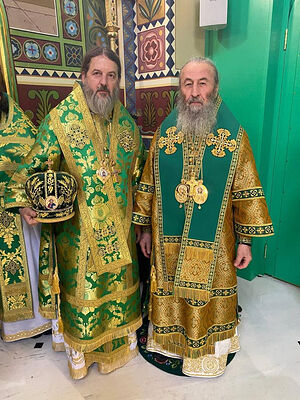 Bishop Theodosius with His Beatitude Metropolitan Onufry of Kiev and All Ukraine —Vladyka, the Ukrainian authorities ordered the monks of the Kiev Caves Lavra to vacate the premises by March 29. Is this a direct interference in the ecclesiastical life of the Ukrainian Orthodox Church (UOC)?
Bishop Theodosius with His Beatitude Metropolitan Onufry of Kiev and All Ukraine —Vladyka, the Ukrainian authorities ordered the monks of the Kiev Caves Lavra to vacate the premises by March 29. Is this a direct interference in the ecclesiastical life of the Ukrainian Orthodox Church (UOC)?
—Without a doubt, it is an intrusion into the ecclesiastical life of the UOC. The Ukrainian President Vladimir Zelensky and his entourage are not Orthodox Christians. They know nothing about the Church Statutes, canon law or the Holy Tradition. Under the guidance of the Patriarchate of Constantinople, the president was ordered to unite the canonical Ukrainian Orthodox Church with the schismatic Orthodox Church in Ukraine (OCU). In fact, when efforts at amicable unification failed, Constantinople once again misinformed the president, demanding that he’d simply seize the churches and monasteries belonging to the UOC and transfer the holy sites under the jurisdiction of the OCU.1
Additionally, the government and the so-called “independent” parties persecute those members of the clergy who disagree with the OCU and conduct illegal searches, impose sanctions and threaten to deprive them of citizenship. It’s unbelievable, but such disgusting steps are taken in the so-called “civilized” twenty-first century by the Western countries and the Orthodox Patriarchate!
Incredibly, such disgusting steps are made possible in the twenty-first century under the auspices of the Orthodox Patriarchate!
—Vladyka, the Kiev Caves Lavra is not only a holy place for you. You became one its first monks in 1988, when it was reopened to the Church. How is it for you live through the current turmoil?
—For me, the current situation brings immense sorrow. In 1988, the year of the celebration of the 1000th Anniversary of the Baptism of Rus, we received this major holy place, the first monastery of the Kievan Rus that it bound up with the ascetic labors of Sts. Anthony and Theodosius of the Kiev Caves. Its churches and buildings were crumbling at that time. It was impossible for us to serve at any of its cave churches. We had to serve an early-morning Divine Liturgy in the caves and the late-morning service outside, on the territory of the Lavra. We also had evening services in the open gallery under the Church to the Nativity of the Mother of God or in the square in front of the Far Caves.
Over the time since the monastics began inhabiting the Lavra, all the churches have been restored, and the new ones were built, including the Lavra’s Dormition Cathedral and others; the old monastic quarters were renovated, new buildings were added, and the educational institutions were opened: the Theological Academy and the Seminary, many new workshops were added and water wells were restored.
I feel deep sorrow over the news of the eviction of the brethren and the transfer of the relics to the schismatics. Peace can only be found through prayer, the calling on the Lord, His Most Pure Mother, and all the venerable saints of the Kiev Caves, when we rely on the words of Holy Scripture: God is not mocked: for whatsoever a man soweth, that shall he also reap (Galatians 6:7).
—Could you have imagined back in 1988 that only thirty-five years later the Lavra would again be under the threat of closure?
—I could never, ever fathom this at the time. However, after we had reopened the Lavra, some atheists among those who carried out certain activities in the “historical reserve,” as they called the monastery at that time, spread rumors that, once the monks had rebuilt and brought everything into good order, “we would take it back again later.” It was hard to believe their rantings then, as they “prophesied” to us from behind the scenes. But today, with the imminent threat looming over us, it is obvious that it is the work of practically the same people, who are led by the father of lies.
What brings comfort is to hear the words of the Lord spoken through the apostles to all of us: In the world ye shall have tribulation: but be of good cheer; I have overcome the world (John 16:33).
—How do the brethren of the monastery endure the current crisis?
—The brethren of the monastery are sorrowful and grieving. They have increased their prayers. Together with His Beatitude Onufry Metropolitan of Kiev and All Ukraine, and Metropolitan Pavel, the Lavra’s abbot, they celebrate the services under the open air on the territory of the Lavra once again. This is due to a large influx of believers, which cannot physically be gathered in any one of the Lavra churches. They read akathists, hold prayer services to the venerable fathers of the Kiev Caves, and seek their intercession. For the Lord knoweth the way of the righteous: but the way of the ungodly shall perish Ps. 1:6)
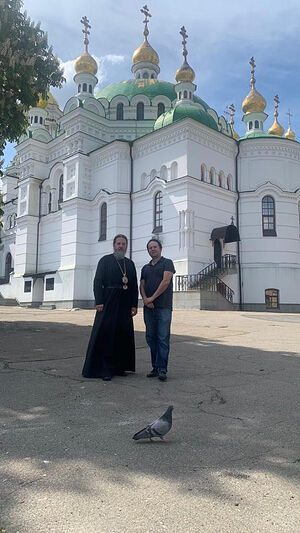 Bishop Theodosius with his brother at the Kiev Caves Lavra —You surely have many acquaintances and brothers in spirit in the Lavra with whom you still keep in touch.
Bishop Theodosius with his brother at the Kiev Caves Lavra —You surely have many acquaintances and brothers in spirit in the Lavra with whom you still keep in touch.
—Yes, I have many monks in the Lavra who are spiritually close to me. There are some who were there when we reopened the Lavra and they labor at various obediences. Others remember me because they entered the Lavra during my time there. When I am in Kiev, I serve with the brethren in Lavra’s churches, and, when some of the brethren come as pilgrims from the Lavra to our diocese, they concelebrate with us. All in all, we maintain a prayerful bond that cannot be taken away neither in this world nor in the world to come.
—There was only one power that drove the canonical Church away from the Lavra, the Soviet authorities. Is the current leadership of Ukraine, which is driving the monks out once again, following the same path?
—Yes, the authorities in power today there. Even if they may not consider themselves Soviet, but the post-Soviet power, their actions must be seen from the same angle, or even worse. If the Soviet regime destroyed churches or made warehouses, planetariums, museums of atheism, houses of culture or cinemas out of them, our Lavras were renamed, “historical reserves”. Then the present regime, under the guise of benevolent intentions, hands them over to schismatics who immediately desecrate the sacred places by their actions. Their ungodly acts are visible to the whole world through YouTube channels, where any sane person can see what they are doing with our churches, turning them into concert venues or imitating divine services by dressing up in vestments and giving the impression of services and sacraments.
The schismatic group, despite its apparent similarity to the canonical Church, lacks apostolic succession. But what’s most important, it lacks the Grace of the Holy Spirit. As a rule, such groups, no matter who supports them, can’t last long. They simply get tired of playing Orthodoxy and will eventually return to the fold of the true Church or move away in the opposite direction. They can be compared with writers and poets of the Silver Age who tried to turn life into play-acting (or theatrical performance), but they failed. It is certainly understandable when it comes to writers, but not so much when it comes to men in cassocks.
We see how today the same thing is happening as at the dawn of Soviet rule, only with a greater kind of blasphemy, because they find time to mock at the graves of the Primates of the UOC. It is impossible to watch without tears the videos they distribute online, which they accompany with obscene laughter.
Truly, we can call this the abomination of desolation… in the holy place (Matt. 24:15).
—Metropolitan Mark (Arndt) of Berlin, who was born in Germany under the Nazis, told me that even Hitler did not go as far in his persecution of the Church as the current Ukrainian authorities. Do you have anything to say on this matter?
—Yes, Vladyka Mark is right. The Germans treated our Orthodox shrines with respect. I would also like to remind you that after the Lavra was closed in 1926, its property was plundered by the Renovationists2 and Communists. They didn’t spare either the graves or the bells…
The Germans, on the contrary, when they entered this or that town, opened the monasteries and churches, asking the priests or monastics to return there. This way, the Kiev Caves Lavra was reopened in 1941, along with the St. Vladimir’s Cathedral, which had been restored during the Nazi occupation of Kiev.
—What are the remaining options for the monks of the Lavra and its parishioners? To submit to the demands of the authorities and lose the holy monastery, or to remain inside and possibly become the martyrs?
—I think this decision rests solely with the brethren. We can’t push the brethren to the feat of martyrdom. Such a decision is made individually, and under the existing situation—at the counsel of the father confessor or mentor. Therefore, all we have left to do is to pray. There is the following passage from the Holy Fathers: “When a monk leaves the monastery, the grace remains in it, but when he is expelled, the grace of the Holy Spirit accompanies him.”
We can’t spur the brethren into martyrdom
—Many Orthodox believers fear that something terrifying will happen once the Lavra is taken over again. What do you think about it?
—Everything is really very serious. I don’t want to mislead people, because if you relax and assume that things will calm down, you may miss the time for repentance and intensified prayer. With the desecration of the holy places, the wrath of God may be poured out immediately; or the Lord, through the prayers and repentance of the people, can change wrath to mercy. This has also happened in history. But we must also remember well that the Lord never forsakes His children: For the Lord will not cast off his people (Ps. 93:14).
—How does your congregation in the United States feel about these events? Does the flock support you, knowing your personal connection with the Lavra, the Ukrainian Orthodox Church and Ukraine, in general?
—Yes, the flock supports me and prays for our holy monastery, the Kiev Caves Lavra, and other churches. We also pray for the suffering Ukrainian land and we help the UOC and the people in any way we can.
—You were named Theodosius in honor of the Saint Theodosius of the Caves, so it would be right to say that you have a double connection with the Lavra. Do you feel your heavenly patron’s support in today’s situation?
—Undoubtedly, yes. My patron saint is known as the founder of monasticism in the Holy Rus. Not only does he help me, a bearer of his name, but he also helps everyone who appeals to him with faith. I hope that he will also protect our Lavra, our city and all our holy relics: The LORD gives his people strength; the LORD blesses his people with peace (Psalm 28: 11).

